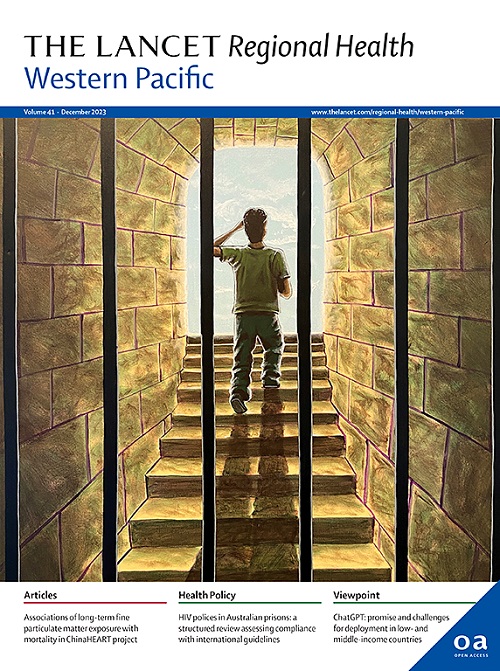Framing effects in decision aid-based lung cancer screening: a randomized clinical pilot trial in primary care
IF 7.6
1区 医学
Q1 HEALTH CARE SCIENCES & SERVICES
引用次数: 0
Abstract
Background
The balance of risks and benefits associated with low-dose CT (LDCT) screening necessitates that high-risk individuals make informed decisions about lung cancer screening (LCS) based on their preferences. Patient decision aids (PDAs) can align these choices with patient values, and research indicates that message framing (gain vs. loss) significantly impacts decision-making. Despite extensive public health research on framing effects, there is limited understanding of how these messages can enhance LCS uptake. To address this gap, our research team developed the first LCS PDA in China, the LCS Loss-Gain Balance (LCS-LG-B), which integrates both gain-framed (emphasizing the benefits of healthy behaviors) and loss-framed (highlighting the costs of inaction) approaches. This study aims to investigate the effects of this PDA-based program on LCS behaviors among high-risk Chinese individuals.
Methods
An intervention was designed around the LCS-LG-B to increase LDCT screening rates among high-risk individuals. This intervention included lung cancer risk assessments, education on lung cancer and LCS, shared decision-making exercises, and support for screening behaviors (e.g., smoking cessation resources, LCS information, and patient-doctor communication groups). A randomized clinical pilot trial was conducted with 72 high-risk lung cancer individuals in southeastern China from May 10, 2023, to February 10, 2024, with follow-up until October 10, 2024. Participants were randomly assigned to either the loss-framed or gain-framed version of the LCS-LG-B. Outcomes assessed at baseline (T0), immediately after the intervention (T1), and at one (T2), three (T3), and six months (T4) included LCS knowledge, health beliefs, decision conflict, self-efficacy, preparation, regret, and LDCT rates. Data were analyzed using a generalized linear mixed model and Chi-square tests, and the study is registered at the Chinese Clinical Trial Registry (ChiCTR2300071171).
Findings
Sixty participants (30 from each group) completed all outcome measurements. Significant improvements were noted in decision conflict (F = 50.177, P < 0.001), self-efficacy (F = 57.505, P < 0.001), preparation (F = 45.599, P < 0.001), regret (F = 8.886, P < 0.001), LCS knowledge (F = 70.981, P < 0.001), health beliefs (F = 21.149, P < 0.001), perceived barriers (F = 20.020, P < 0.001), and perceived benefits (F = 3.098, P = 0.016). The mean perceived risk score was significantly higher in the loss-framed group at T2 (D = 1.533, P = 0.004), T3 (D = 1.900, P < 0.001), and T4 (D = 1.267, P = 0.017). However, there were no significant differences between groups in decision conflict, self-efficacy, preparation, regret, and LCS knowledge at T1, T2, T3, and T4 (P > 0.050). After the intervention, 12 participants (40.00%) in the loss-framed group underwent LDCT compared to 8 (26.67%) in the gain-framed group (χ2 = 1.200, P = 0.273).
Interpretation
The LCS-LG-B addresses a research gap in Chinese LCS PDAs and is the first to apply cognitive framing in LCS decision-making. It effectively enhances LCS knowledge, health beliefs, decision quality, and LDCT rates among high-risk populations. This advancement supports informed LCS decisions and facilitates early lung cancer diagnosis. Future research should further explore the mechanisms and impacts of framing effects on LCS decision-making.
基于决策辅助的肺癌筛查中的框架效应:一项初级保健的随机临床试验
背景:为了权衡低剂量CT (LDCT)筛查的风险和益处,高危人群必须根据自己的喜好做出关于肺癌筛查(LCS)的明智决定。患者决策辅助(pda)可以使这些选择与患者的价值观保持一致,研究表明,信息框架(收益与损失)显著影响决策。尽管对框架效应进行了广泛的公共卫生研究,但对这些信息如何增强LCS吸收的理解有限。为了解决这一差距,我们的研究团队在中国开发了第一个LCS PDA,即LCS损益平衡(LCS- lg - b),它整合了收益框架(强调健康行为的好处)和损失框架(强调不作为的成本)方法。本研究旨在探讨基于pda的项目对中国高危人群LCS行为的影响。方法围绕LCS-LG-B设计干预措施,提高高危人群LDCT筛查率。该干预措施包括肺癌风险评估、肺癌和LCS教育、共享决策练习以及对筛查行为的支持(例如戒烟资源、LCS信息和医患交流小组)。本研究于2023年5月10日至2024年2月10日在中国东南部地区对72例肺癌高危人群进行随机临床试验,随访至2024年10月10日。参与者被随机分配到失帧或增益帧版本的LCS-LG-B。在基线(T0)、干预后(T1)、1个月(T2)、3个月(T3)和6个月(T4)评估的结果包括LCS知识、健康信念、决策冲突、自我效能、准备、后悔和LDCT率。数据分析采用广义线性混合模型和卡方检验,该研究已在中国临床试验注册中心注册(ChiCTR2300071171)。60名参与者(每组30名)完成了所有结果测量。决策冲突显著改善(F = 50.177, P <;0.001)、自我效能感(F = 57.505, P <;0.001),制剂(F = 45.599, P <;0.001),后悔(F = 8.886, P <;0.001), LCS知识(F = 70.981, P <;0.001)、健康信念(F = 21.149, P <;0.001),感知障碍(F = 20.020, P <;0.001)和感知获益(F = 3.098, P = 0.016)。在T2 (D = 1.533, P = 0.004)、T3 (D = 1.900, P <;0.001), T4 (D = 1.267, P = 0.017)。然而,在T1、T2、T3和T4阶段,决策冲突、自我效能、准备、后悔和LCS知识在组间无显著差异(P >;0.050)。干预后,失框组12人(40.00%)接受LDCT,而增框组8人(26.67%)接受LDCT (χ2 = 1.200, P = 0.273)。LCS- lg - b解决了中国LCS决策的研究空白,并首次将认知框架应用于LCS决策。它有效地提高了高危人群的LCS知识、健康信念、决策质量和LDCT发生率。这一进展有助于LCS做出明智的决策,并促进肺癌的早期诊断。未来的研究应进一步探讨框架效应对LCS决策的作用机制和影响。
本文章由计算机程序翻译,如有差异,请以英文原文为准。
求助全文
约1分钟内获得全文
求助全文
来源期刊

The Lancet Regional Health: Western Pacific
Medicine-Pediatrics, Perinatology and Child Health
CiteScore
8.80
自引率
2.80%
发文量
305
审稿时长
11 weeks
期刊介绍:
The Lancet Regional Health – Western Pacific, a gold open access journal, is an integral part of The Lancet's global initiative advocating for healthcare quality and access worldwide. It aims to advance clinical practice and health policy in the Western Pacific region, contributing to enhanced health outcomes. The journal publishes high-quality original research shedding light on clinical practice and health policy in the region. It also includes reviews, commentaries, and opinion pieces covering diverse regional health topics, such as infectious diseases, non-communicable diseases, child and adolescent health, maternal and reproductive health, aging health, mental health, the health workforce and systems, and health policy.
 求助内容:
求助内容: 应助结果提醒方式:
应助结果提醒方式:


